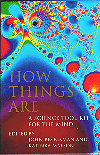Further Reading

How Things Are: A Science Toolkit for the Mind
Edited by John Brockman and Katinka Matson
Part One : Thinking About Science
Nothing But or Anything But? Marian Stamp
Dawkins
On the Naturalness of Things Mary Catherine
Bateson
Good and Bad Reasons for Believing Richard
Dawkins
Part Two : Origins
What Happened Before the Big Bang? Paul
Davies
The Joy of Water P.W.Atkins
Where Do We Come From? Robert Shapiro
Who Do We Blame for What We Are? Jack Cohen
Triumph of the Embryo Lewis Wolpert
From Kefir to Death Lynn Margulis
Part Three : Evolution
Three Facets of Evolution Stephen Jay Gould
Our Gang Milford H.Wolpoff
What About Incest? Patrick Bateson
Why Are Some People Black? Steve Jones
Chance and the History of Life Peter Ward
Nobody Loves a Mutant Anne Fausto-Sterling
Part Four : Mind
How to Make Mistakes Daniel C. Dennet
Can Minds Do More Than Brains? Hao
Wang
How to Think What No One Has Ever Thought Before William C Calvin
The Puzzle of Averages Michael S. Gazzaniga
Ceteris Paribus (All Else Being Equal) Pascal Boyer
On Taking Another Look Nicholas
Humphrey
What to Know,How to Learn It Roger C. Shank
How Do We Communicate? Dan Sperber
Minds,Brains and Rosetta Stones Steven Rose
Study Talmud David Gelernter
Identity in the Internet Sherry Turkle
Part Five : Cosmos
What is Time? Lee Smolin
Learning What Is,from What Doesn't Alan
H. Guth
Symmetry: The Thread of Reality Ian
Stewart
Special Relativity : Why Can't You Go Faster Than Light? W. Daniel
Hillis
Part Six : The Future
How Long Will the Human Species Last? Freeman Dyson
The Uniqueness of the Present Human Population Joel E. Cohen
Who Inherits the Earth? Niles Eldredge
Can Science Answer Every Question? Martin Rees
Further Reading
How Things Are: A Science Toolkit for the Mind |
| Chaos | Quantum | Logic | Cosmos | Conscious | Belief | Elect. | Art | Chem. | Maths |